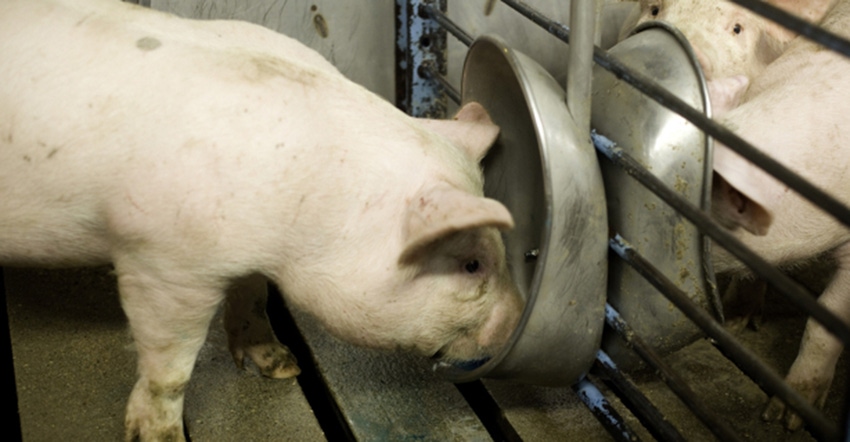Vaccination is the most effective, efficient way to protect pigs from the costly impact of ileitis. Vaccinating helps to boost overall herd immunity.

Sponsored Content
Ileitis is likely causing losses in your swine herd, and you may not even know it. Research shows that 80 to 100% of pigs are infected with Lawsonia intracellularis, the bacteria that causes ileitis.1 That kind of prevalence costs the U.S. swine industry more than $100 million annually and could be costing you up to $10 per head in reduced feed intake, average daily gain and feed conversion efficiency.1
The bacteria L. intracellularis is introduced into the pig’s intestines through fecal ingestion. Once there, it multiplies and causes lesions to form in the intestinal wall. These lesions reduce absorption of nutrients and water, which can quickly impact pig growth and performance. Research also shows that increased severity of lesions in the gut and diarrhea correlate to higher amounts of bacterial shedding, further perpetuating the disease in the herd.2
Clinical symptoms of the disease – diarrhea and slowed growth – are more commonly seen in younger pigs, while acute ileitis is most prevalent in older finishing pigs, gilts and sows, explains Jessica Seate, DVM, swine technical manager for Boehringer Ingelheim. “The real problem with ileitis is the animals that have the subclinical, or hidden, stage of the disease. They may experience reduced weight gain without showing any other signs.”
Ileitis can affect weight gain in pigs of all ages, but the biggest impact is on those from late-nursery to finishing, she says. “That’s when daily weight gain is critical for optimizing growth and animal health.”
Most effective prevention
Vaccination is the most effective, efficient way to protect pigs from the costly impact of ileitis. Vaccinating the whole herd helps to boost overall herd immunity, says Seate. “Improved gut health throughout the herd also helps to reduce the impact of secondary pathogens.”
But not all vaccines deliver the same controlled results, she adds. “A modified-live vaccine more closely mimics the disease than a killed vaccine does, which allows it to provide faster, more robust immune response in the animal and provide a longer duration of immunity.”
A recent study demonstrated that Enterisol® Ileitis, the only commercially available modified-live oral ileitis vaccine provided more effective protection against ileitis than a leading injectable killed vaccine.3
The right vaccine
Previous research has shown a strong correlation between the presence of intestinal lesions caused by L. intracellularis and reduced pig growth and performance.2,4 The latest study compared the presence and severity of lesions found in the intestines of weaned pigs split into three groups – one receiving an oral dose of Enterisol® Ileitis, the second receiving an intramuscular injection of Porcilis® Ileitis and a third control group receiving no vaccine. All pens were exposed to seeder pigs which were challenged with L. intracellularis at 12 weeks post weaning.
Four weeks later, necropsy results from pigs randomly selected from each pen that were indirectly challenged from the seeder pigs showed that, while all pigs had microscopic lesions in the ileum sections of the intestine, those vaccinated with Enterisol® Ileitis were 99.33% lesion-free versus Porcilis® Ileitis-treated pigs that developed more severe lesions (43.33% IHC positives) or non-treated (63.33% IHC positives) groups. Pigs vaccinated with Enterisol® Ileitis had no lesions in the cecum section compared to 3.33% in pigs treated with Porcilis® Ileitis and 13.33% in non-treated pigs. Previous studies have demonstrated that with increased prevalence and severity of ileocecal lesions there is a decrease in pig performance.2,4
“Because it’s orally administered through the water supply, Enterisol® Ileitis builds immunity right where the bacteria live and infect,” explains Seate. “Antibodies are created in the gut more rapidly to build immunity right where additional infections might occur.
“Ileitis can quickly start to steal profits from a hog operation,” she adds. “Producers need to get ahead of the disease, and a robust vaccination program is their most effective tool.”
For more information on Enterisol® Ileitis, talk to your veterinarian, your BI sales representative or visit bi-vetmedica.com/species/swine/products/enterisol_ileitis.html.
Sources:
1 Agriculture 2013, 3, 536-555; doi:10.3390/agriculture3030536.
2 Burrough ER, Rotolo ML, Gauger PC, et al. Correlation of Lawsonia intracellularis semi-quantitative fecal polymerase chain reaction assay results with the presence of histologic lesions of proliferative enteropathy and positive immunohistochemical staining. J Swine Health Prod. 2015. 23(4):204-207.
3 Dee S, Nerem J, Hanson D, Seate J, Wetzell T, Edler R, Schmaling E. Comparison of intestinal lesions between Enterisol® Ileitis and Porcilis® Ileitis using a Lawsonia intracellularis mucosal homogenate seeder pig challenge model. 2015. Pipestone Veterinary Services, Pipestone, MN. Boehringer Ingelheim Vetmedica, Inc., St. Louis, MO.
4 Collins, AM, Barchia IM. The critical threshold of Lawsonia intracellularis in pig feces that causes reduced average daily weight gains in experimentally challenged pigs. Vet. Microbiol. 2013.12.003.
Enterisol is a registered trademark of Boehringer Ingelheim Vetmedica GmbH. Porcilis is a registered trademark of Merck Animal Health. Ó2017 Boehringer Ingelheim Vetmedica, Inc.
About the Author(s)
You May Also Like



